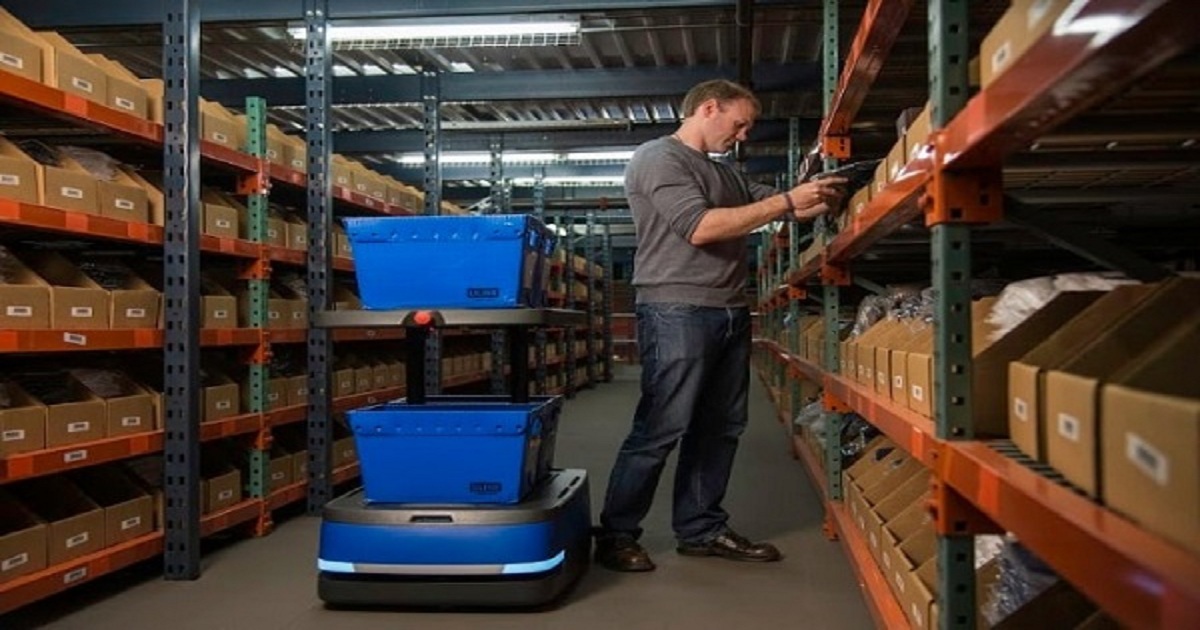
Transportation
Article | April 26, 2023
You might be wondering what the benefits are of benchmarking. Well, imagine you are training for a 100 metre sprint in your district. What would be the key number, or metric that you would need to know?
It would, of course, be what the winning time was when this race was last run in your district. Without that information, you don’t know what you’re trying to target. It would be impossible to know if you’ll have any chance at all of winning the race.
It’s exactly the same in business. If, for example, you are concerned about the pick rates in your warehouse, or your transport costs, or your inventory accuracy, benchmarking can help you because it can show you exactly where your performance is compared to others in your industry.
A few years ago, I was working with an automotive parts business. They had a little issue with their picking productivity in the warehouse. They wondered how good it was, whether they could improve it. They actually thought it was okay.
We looked at the figures and compared them with other businesses. This helped us realise that their picking productivity should be three times better than it was. And believe it or not, over a few months they did begin to improve their productivity.
Why? Because benchmarking opened their eyes to the fact that they were at a level quite far below others in the industry.
That’s the beauty of benchmarking. Until you know what others are doing, you can’t be sure how good your performance is.
If you’ve never tried benchmarking, there are three ways you could do it.
1. Informal Benchmarking
This exercise would involve you measuring particular functions or aspects of your business and comparing that against other parts of your business. Let’s say you have a warehouse operating in one city and another operating in another city. You might start to measure the same metrics and see which one is performing better.
You might know other people in the industry who are also operating warehouses so you might agree to share some data with them.
This is probably the easiest way to start off, but it has some downsides:
You’re only measuring against a very small sample size. If all of you in the pool are not that good, how would you know what good is?
You have to make sure that the businesses are similar and you are measuring things in exactly the same way. It’s very important in benchmarking to have a standard way of applying the metric.
2. Formal Benchmarking
This can work for much larger businesses. Perhaps you have operations in many different countries. You could agree a formal structure for how you are going to measure performance. You could do monthly or quarterly benchmarks with all the parts of your international organisation. You could learn from each other and share best practice.
This method is okay but you’re not getting access to a very large pool of results to measure yourself against. You will find that companies are very reluctant to give out benchmarking data. You might also be operating in an environment where the performance is quite low right across the business.
3. Hire a Professional Benchmarking Firm
This is the ultimate way to do it, although there are not a lot of professional benchmarking firms such as ours around. If you do manage to find one, you will quickly realise that there are significant benefits to be had by bringing in the professionals:
The metrics are put together in exactly the same way: When we do a benchmarking exercise for our consulting clients, we go through a very robust data-gathering process and then make sure all the costs, for example, are in the same buckets as everyone else’s in the database.
You gain access to a big pool of results: Professionals have measured hundreds, if not thousands, of companies. This enables you to say, ‘Our company is this size, it operates in this industry, these are the characteristics of our supply chain, who else in that pool of results is like us? We want to be measured against them.”
It’s no good measuring the performance of a grocery retailer, for example, against an industrial product supplier. They have different supply chains. You need to be measuring like with like.
Read More

Supply Chain
Article | May 26, 2023
Automated supply chain planning maximizes efficiency and helps achieve long-term success by addressing challenges, highlighting the benefits, and offering insights to optimize business performance.
Contents
1 Supply Chain Planning System Efficiency Maximization
2 Key Steps of Supply Chain Planning to Boost Efficiency
2.1 Implement Advanced Analytics Tools
2.2 Streamline Communication and Collaboration
2.3 Automate Processes
2.4 Consistency in Performance Improvement
3 Overcoming Major Challenges in the Process to Maximize Efficiency
3.1 Resistance to Change
3.2 Legacy Systems and Siloed Data
3.3 Inadequate Funding
4 Conclusion
1 Supply Chain Planning System Efficiency Maximization
To compete and succeed in an ongoing complex and dynamic global market, companies must maximize the efficiency of their supply chain planning systems, which help manage the flow of goods and services from suppliers to customers, optimize resources and information to meet customer demands and minimize costs and risks. An adequate supply chain planning system can increase customer satisfaction, profitability, agility, and risk management. Moreover, by reducing costs, increasing productivity, and enhancing responsiveness to market demands, maximizing efficiency can help businesses remain competitive. As a result, businesses can gain a substantial competitive edge and position the organization for long-term success by optimizing their supply chain planning systems.
2 Key Steps of Supply Chain Planning to Boost Efficiency
Businesses can significantly boost efficiency in their supply chain planning by implementing advanced analytics tools, streamlining communication and collaboration, automating processes, and ensuring consistency in performance improvement.
2.1 Implement Advanced Analytics Tools
Implementing advanced analytics in supply chain planning is key to improve supply chain efficiency. Advanced analytics tools, including demand forecasting, production planning and inventory management, can help organizations leverage large volumes of data to extract insights that enable better decision-making. The insights can be used to optimize production planning, reducing costs and increasing efficiency. In addition, it also enables businesses to detect and respond to supply chain disruptions on operations.
2.2 Streamline Communication and Collaboration
Managing and streamlining communication becomes essential for supply chain businesses, as it leads to greater agility and enables pipelines to adapt to changes in organizational structures. Leveraging cloud-based communication platforms, video conferencing, and collaboration tools enable real-time information sharing and collaboration across different teams and stakeholders. By enhancing communication and collaboration, businesses can better align their supply chain objectives, reduce communication gaps, and enhance decision-making.
2.3 Automate Processes
The integration of technologies such as order processing, inventory management, and shipment tracking under warehouse automation and logistics automation produces a vast amount of data, making it challenging for businesses to process data manually. To enhance efficiency, automating supply chain planning processes has become essential. Automating the process has eliminated multitasking, including managing goods flow, tracking road progress, and ensuring safe delivery, which was previously required in the manual process. By automating processes, supply chain management can be streamlined, leading to reduced lead times, minimized costs, and improved efficiency.
2.4 Consistency in Performance Improvement
Improving the supply chain is not a one-time fix, but a process that must be reviewed and optimized frequently. By implementing technology, businesses can continuously collect and analyze warehouse inventory management performance to identify areas for further efficiency gains and improved order accuracy. In addition, establishing a framework for continuous optimization involves regular performance reviews, feedback mechanisms, and benchmarking against industry best practices to help identify and address inefficiencies.
3 Overcoming Major Challenges in the Process to Maximize Efficiency
3.1 Resistance to Change
Supply chain planning systems are hindered by change resistance. Employees may resist change who are comfortable with the status quo and adopt new technologies and processes less often. Organizations need a comprehensive change management plan to address stakeholder engagement, communication, and training. Implementing a change management plan starts with identifying the key stakeholders and involving them in planning to gain their buy-in and support for the changes, implementing the process of the changes using different channels to reach all stakeholders and in addition, developing training programs to prepare employees for the changes and enable them to use new technologies and processes effectively.
3.2 Legacy Systems and Silos Data
Data silos and a lack of supply chain visibility are two problems that can arise when legacy systems and data are used. It also adds roadblocks in maximizing efficiency through supply chain planning software. Investing in older systems makes it challenging to gain a comprehensive view of the supply chain and informed decisions making. In addition, the systems are non-compatible with modern technology and data is stored in disconnected systems. With the help of an integrated system, all relevant information can be collected in one place, streamlining monitoring and decision-making. A data governance policy should be implemented to guarantee data quality and uniformity across all platforms. Data management, data storage, data sharing, regular monitoring and reporting on data quality are all essential components of this policy.
3.3 Inadequate Funding
Insufficient funding can affect supply chain planning system efficiency; with budget constraints, organizations may struggle to invest in new technologies, hire skilled workers, or improve processes. Thus, the supply chain planning system may become obsolete, increasing costs, lead times, and customer dissatisfaction. To overcome the challenge of inadequate funding in supply chain planning, organizations must prioritize funding and strategically allocate resources by identifying the areas that require the most investment. Exploring alternative funding sources, such as grants and partnerships, can supplement existing funding and enable organizations to invest in vital initiatives that may not have been possible with limited resources. In addition, cost-cutting measures, such as process optimization and automation, can help to stretch existing funds and boost productivity.
4 Conclusion
The supply chain planning system will continue to play a critical role in maximizing efficiency to revolutionize the supply chain professionals leverage emerging technologies such as AI, ML, and blockchain; understanding the process, identifying the challenges and overcoming them using the right strategies helps businesses in effective supply chain planning systems, gain a competitive advantage, improve supply chain performance and position themselves for long-term success. Furthermore, adopting a data-driven approach and a culture of continuous improvement in supply chain management planning can help organizations plan according to the future of supply chain and compete in the ever-changing global market.
Read More

Warehousing and Distribution
Article | July 11, 2023
Order picking is the most resource-intensive operation of a warehouse or fulfillment center. More than 55% of the operating cost for a warehouse is related to order picking, and fulfillment centers, the number stands at 50%. It is the process that can bring in the most cost savings with an effective, streamlined and efficient order picking system. One of the most important components of your order picking system is the warehouse order picking cart. Order picking carts are used to move inventory from the warehouse shelves to sorting or packing stations. They make it easier for warehouse associates to carry multiple items at a time or to carry large, unwieldy items. When it is possible to carry multiple items on a trip, it drastically reduces the distance traveled by associates on foot. It also helps to reduce physical fatigue and improves efficiency dramatically.
Read More

Software and Technology, Logistics
Article | July 8, 2022
Introduction
From warehouse robots to delivery drones, the supply chain is experiencing a tremendous upheaval. AI promises a totally autonomous and self-organized future supply chain. A fleet of vehicles utilizing a swarm algorithm can enhance cargo yard throughput; a trusted peer-to-peer ledger on blockchain architecture could change compliance in the sector; and wearables, mobile robotics, and machine learning technologies could speed up order fulfilment. IOT e-brokerage solutions can link shops to couriers and transporters with a click. Tomorrow's supply chain will be leaner, quicker, and self-organized. A few innovative technologies will fuel this unparalleled rate of change over the next 15 years. Here are the major technologies that are shaping the future of the logistics industry.
Logistics Technologies for the Future
Shipment Tracking Systems
Previously, customers ordered shipments, had an anticipated arrival date, and then were kept in the dark until they chose to call. Customers can now access shipping and tracking systems around-the-clock due to developments in the internet and software. This not only enhances the customer experience (cx), but it also saves the business time and money.
Internet of Things (IoT)
The IoT reduces costs and delays by minimizing hazards in the supply chain. Cabs, cargo ships, trains, etc., have sensors that link to an alarm system or dispatcher. These sensors analyze and communicate information to the crew, who learns about hidden threats. IoT isn't a new technology, but it continues to influence logistics by improving in-transit visibility and delivery.
Radio Frequency Identification (RFID)
RFID technology has been used for a few years to monitor inventories labor-efficiently. A product tag or sensor produces radio waves. The company processes the data. RFID tags are similar to barcodes, but their faster information transport and data processing appeal to companies and the direction of technology. Many organizations use RFID tags to track containers in warehouses.
Enhanced GPS Accuracy
Almost everyone utilizes GPS on their vehicles or smartphones. These devices' accuracy has improved over time, assisting lost drivers and enhancing the supply chain. By monitoring truck locations and boosting hauls with current traffic data, GPS increases efficiency and customer satisfaction.
Closing Lines
Unprecedented times have produced unprecedented transformations that will last for generations. Changing demographics, technology improvements, and COVID-19 impacts are altering global supply networks. We must understand the driving factors and act on what we learn to adapt and rise to the situation. For the sake of our current workforce and future generations.
Read More